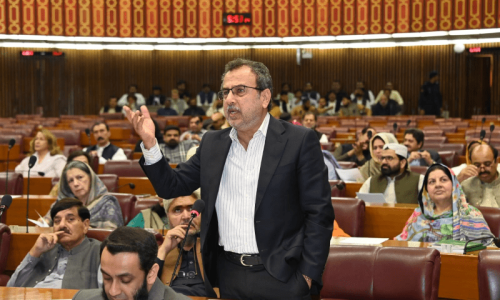KARACHI: Sindh Minister for Health Dr Azra Pechuho has formally approached the federal government with the request to do away with the Pakistan Medical Commission Act, 2020 and, instead, continue with the previous policy.
In a letter addressed to Prime Minister’s Special Assistant on National Health Services, Regulations and Coordination Dr Faisal Sultan, the provincial health minister stated that the establishment of the PMC, which was yet to be functionalised, had created chaos as provinces had already initiated the process for MBBS and BDS admissions when the PMC Act was promulgated.
She referred to the publication of Sindh government’s advertisement for admissions, and said that October 5 had been fixed for submission of forms and more than 20,000 candidates had already submitted their applications. The test was scheduled for October 18 but surprisingly the PMC Act was promulgated on Sept 24, hindering the ongoing process, she pointed out.
Dr Pechuho conveyed to the PM’s aide that the PMC, which was yet to be functionalised properly, had created unrest and chaos among the students.
Sindh approaches centre against new law
The minister’s letter, dated Oct 1, highlighted certain discrepancies in the matter, pointing out that there was no representation of Sindh on the Pakistan Medical and Dental Council (PMDC) — a component of the PMC — although health was purely a devolved subject under the 18th Constitutional Amendment’.
Secondly, she noted, the council was being run without a president and a vice president. The instructions regarding conduct of MDCAT exams at the national level have been issued though Section-4 (3) of the act which states: “The President and Vice President of the council shall be appointed from among the members of the council by the federal government”, she argued.
The health minister was of the opinion that the act would aggravate the problem of doctors’ shortage in Sindh, where the annual number of MBBS graduates stood at around 5,000, which was not sufficient to meet provincial requirement.
“Of them, around 25,00 doctors graduate from public sector universities (which will be allowed to observe the provincial domicile policy under this law) while a larger number of doctors, around 2,700, graduate from private universities, which have been allowed to admit students without a domicile bar (under the PMC Act).”
The minister also referred to a recent meeting of the vice chancellors of medical universities and colleges in Sindh, and said it unanimously urged the government of Sindh not to agree with the amendments to the policy.
“All participants were of the view that the new policy would cause a lot of disturbance and suffering to students and the Act would turn medical education into a commercial venture”, she said, adding: “Hence, the old policy may be continued in order to safeguard the interests of Sindh province”.
Published in Dawn, October 6th, 2020
















































Dear visitor, the comments section is undergoing an overhaul and will return soon.